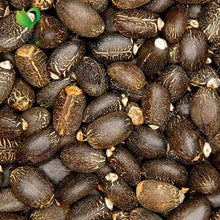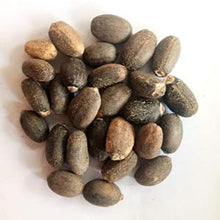Jatropha Curcas (Physic Nut) Perennial
Introducing our premium Purelyagro Jatropha Seeds, a remarkable natural resource with diverse applications that span from agriculture to biofuel production! Jatropha Seeds, scientifically known as Jatropha curcas, are prized for their versatility, sustainability, and potential impact on various industries. We take great care in sourcing and providing you with the finest Jatropha Seeds, ensuring you have access to this exceptional plant with countless possibilities.
Jatropha Seeds are characterized by their small, dark-colored kernels and outer shells. They offer a wide range of qualities and uses, making them a valuable addition to agriculture, energy production, and more. Here are some key attributes and uses of our premium Jatropha Seeds:
- Sustainable Biofuel Production: Jatropha Seeds are renowned for their potential as a source of sustainable biofuel. The seeds contain oil that can be extracted and processed into biodiesel, offering an environmentally friendly alternative to fossil fuels.
- Agricultural Significance: Jatropha plants are cultivated for their seeds, which can be used to produce biodiesel and animal feed. The byproducts of oil extraction can also be used as organic fertilizer.
- Potential Health and Wellness Benefits: In some traditional medicine systems, Jatropha Seeds are believed to offer potential therapeutic properties. However, their use in this context should be approached with caution and under the guidance of healthcare professionals.
- Industrial Applications: Jatropha oil is used in various industrial applications, including the manufacturing of soaps, lubricants, and bio-based materials.
- Environmental Sustainability: Jatropha cultivation is considered environmentally sustainable, as the plant can grow in arid and semi-arid regions, helping combat desertification and soil erosion.
Embrace the versatility, sustainability, and potential benefits of our premium Jatropha Seeds. Whether you're looking to contribute to a greener future through biodiesel production, explore potential health benefits, or participate in sustainable agriculture, Jatropha Seeds offer a world of possibilities. Make them a part of your journey towards a more sustainable and diverse world.
Preparation and Uses of Jatropha Seeds:
Preparation:
Before using Jatropha Seeds for various applications, it's important to understand their preparation process. Here's how to prepare Jatropha Seeds:
- Harvesting: Jatropha Seeds are typically harvested once the seed pods have matured and turned brown. Care should be taken during harvesting to ensure the seeds are collected without damage.
- Seed Extraction: After harvesting, the seeds are extracted from the seed pods. This can be done by hand or using simple tools to open the pods and collect the seeds.
- Cleaning: The collected seeds should be cleaned to remove any residual plant material or debris. This can be done by winnowing or using a sieve to separate the seeds from impurities.
- Drying (Optional): Depending on their intended use, Jatropha Seeds may be dried to reduce moisture content. This is particularly important if the seeds are to be used for oil extraction or biodiesel production.
Uses:
Jatropha Seeds have various uses, primarily related to agriculture, energy production, and potential health benefits. Here are some common applications:
Agriculture:
- Biodiesel Production: Jatropha Seeds are a valuable source of oil, which can be extracted and processed into biodiesel. This renewable energy source offers an eco-friendly alternative to traditional fossil fuels.
- Animal Feed: The byproducts of Jatropha oil extraction, such as Jatropha seed cake, can be used as animal feed, providing protein and nutrients for livestock.
Potential Health Benefits:
- Traditional Medicine: In some cultures, Jatropha Seeds are believed to offer potential therapeutic properties. They have been used in traditional medicine systems to treat various health issues, but their use in this context should be approached with caution and under professional guidance.
Industrial Applications:
- Soap and Lubricant Production: Jatropha oil is used in industrial applications, including the manufacturing of soaps, detergents, and lubricants.
- Bio-Based Materials: The oil derived from Jatropha Seeds can be used in the production of bio-based materials, such as bio-plastics and bio-lubricants
- Environmental Sustainability: Jatropha cultivation is promoted for its environmental sustainability, as it can be grown in arid and semi-arid regions, helping combat desertification and soil erosion.
The primary use of Jatropha Seeds is in the production of biodiesel and as animal feed. However, their potential applications extend to various industries, making them a valuable and versatile resource with promising potential for sustainable agriculture and alternative energy production.
Properly preserving and storing Jatropha Seeds is essential to maintain their quality and prevent spoilage. Here's how to preserve and store Jatropha Seeds effectively:
- Dry Storage: Jatropha Seeds should be stored in a cool, dry place, away from direct sunlight, humidity, and moisture. High humidity can cause the seeds to spoil and develop mold.
- Airtight Container: Use an airtight container, such as a glass jar or a sealed plastic container, to store Jatropha Seeds. An airtight container helps protect the seeds from moisture, air, and contaminants, ensuring their quality.
- Labeling and Dating: Label the container with the date of storage to keep track of the freshness of the Jatropha Seeds. This allows you to use the older seeds first and helps maintain their quality.
- Regular Inspection: Periodically check the stored Jatropha Seeds for any signs of moisture or mold. If you notice any issues, it's best to discard the affected seeds to prevent contamination of the remaining ones.
- Protection from Pests: Ensure that the storage area is free from pests, as insects or rodents may be attracted to the seeds. If necessary, use pest control measures to safeguard the seeds.
By following these storage practices, you can extend the shelf life of your Jatropha Seeds and ensure that they remain in good condition for various applications, including biodiesel production, animal feed, and potential health uses. Proper storage will help you make the most of this versatile and valuable natural resource.




